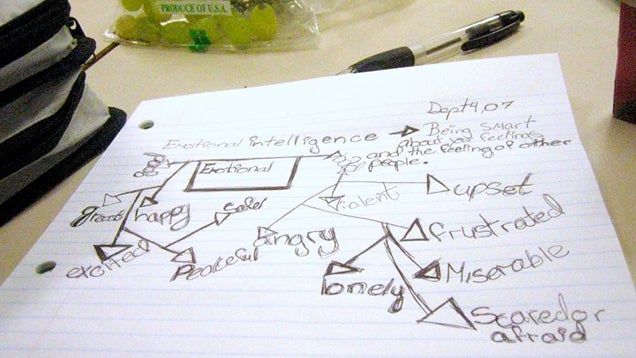You’re taught about history, science, and math when you’re growing up. Most of us, however, aren’t taught how to identify or deal with our own emotions, or the emotions of others. These skills can be valuable, but you’ll never get them in a classroom.
Emotional intelligence is a shorthand that psychological researchers use to describe how well individuals can manage their own emotions and react to the emotions of others. People who exhibit emotional intelligence have the less obvious skills necessary to get ahead in life, such as managing conflict resolution, reading and responding to the needs of others, and keeping their own emotions from overflowing and disrupting their lives. In this guide, we’ll look at what emotional intelligence is, and how to develop your own.
What Is Emotional Intelligence?
Measuring emotional intelligence is relatively new in the field of psychology, only first being explored in the mid-80s. Several models are currently being developed, but for our purposes, we’ll examine what’s known as the “mixed model,” developed by psychologist Daniel Goleman. The mixed model has five key areas:
- Self-awareness: Self-awareness involves knowing your own feelings. This includes having an accurate assessment of what you’re capable of, when you need help, and what your emotional triggers are.
- Self-management: This involves being able to keep your emotions in check when they become disruptive. Self-management involves being able to control outbursts, calmly discussing disagreements, and avoiding activities that undermine you like extended self-pity or panic.
- Motivation: Everyone is motivated to action by rewards like money or status. Goleman’s model, however, refers to motivation for the sake of personal joy, curiosity, or the satisfaction of being productive.
- Empathy: While the three previous categories refer to a person’s internal emotions, this one deals with the emotions of others. Empathy is the skill and practice of reading the emotions of others and responding appropriately.
- Social skills: This category involves the application of empathy as well as negotiating the needs of others with your own. This can include finding common ground with others, managing others in a work environment, and being persuasive.
You can read a bit more about these different categories here. The order of these emotional competencies isn’t all that relevant, as we all learn many of these skills simultaneously as we grow. It’s also important to note that, for our purposes, we’ll only be using this as a guide. Emotional intelligence isn’t an area that most people receive formal training in. We’ll let psychologists argue over the jargon and models, but for now let’s explore what each of these mean and how to improve them in your own life.
Self-Awareness
Before you can do anything else here, you have to know what your emotions are. Improving your self-awareness is the first step to identifying any problem area you’re facing. Here are some ways to improve your self-awareness:
- Keep a journal: Career skill blog recommends starting by keeping a journal of your emotions . At the end of every day, write down what happened to you, how you felt, and how you dealt with it. Periodically, look back over your journal and take note of any trends, or any time you overreacted to something.
- Ask for input from others: As we’ve talked about before when dealing with your self-perception, input from others can be invaluable . Try to ask multiple people who know you well where your strengths and weaknesses lie. Write down what they say, compare what they say to each other and, again, look for patterns. Most importantly, don’t argue with them. They don’t have to be correct. You’re just trying to gauge your perception from another’s point of view.
- Slow down (or meditate): Emotions have a habit of getting the most out of control when we don’t have time to slow down or process them . The next time you have an emotional reaction to something, try to pause before you react (something the internet makes easier than ever, if you’re communicating online). You can also try meditatingto slow your brain down and give your emotional state room to breathe.
If you’ve never practiced intentional self-awareness, these tips should give you a practical head start. One strategy I personally use is to go on long walks or have conversations with myself discussing what’s bothering me. Often, I’ll find that the things I say to the imaginary other end of the conversation can give me some insight into what’s really bugging me. The important aspect is to look inwards, rather than focusing solely on external factors.
Self-Management
Once you know how your emotions work, you can start figuring out how to handle them. Proper self-management means controlling your outbursts, distinguishing between external triggers and internal over-reactions, and doing what’s best for your needs.
One key way to manage your emotions is to change your sensory input. You’ve probably heard the old advice to count to ten and breathe when you’re angry. Speaking as someone who’s had plenty of overwhelming issues with depression and anger, this advice is usually crap (though if it works for you, more power to you). However, giving your physical body a jolt can break the cycle. If you’re feeling lethargic, do some exercise. If you’re stuck in an emotional loop, give yourself a “snap out of it” slap. Anything that can give a slight shock to your system or break the existing routine can help.
Lifehacker alum Adam Dachis also recommends funneling emotional energy into something productive. It’s alright to let overwhelming emotions stew inside you for a moment, if it’s not an appropriate time to let them out. However, when you do, rather than vent it on something futile, turn it into motivation instead:
I recently started playing tennis for fun, knowing that I’d never become exceptional because I began too late in life. I’ve become better and have a very minor talent for the game, so when I play poorly I now know and I get down on myself. When up against an opponent with far more skill I find it hard to do much else than get angry. Rather than let that anger out, I take note of it and use it to fuel my desire to practice more. Whether in sports, work, or everyday life, we can get complacent with our skill and forget that we always have some room for improvement. When you start to get mad, get better instead.
You can’t always control what makes you feel a certain way, but you can always control how you react. If you have some impulse control problems, find ways to get help when you’re feeling calm. Not all emotions can be vented away. My struggle with depression taught me that some emotions persist long after the overflow. However, there’s always a moment when those feelings feel a little less intense. Use those moments to seek help.
Read Also: How-to-write-the-best-Meta-Description-for-SEO
Motivation
We talk about motivation a lot . When we’re talking about motivation as it relates to emotional intelligence, however, we don’t just mean getting up the energy to go to work. We’re talking about your inner drive to accomplish something. That drive isn’t just some feel-goody nonsense, either. As Psychology today explains, there’s a section of your prefrontal cortex that lights up at the mere thought of achieving a meaningful goal.
Whether your goal is building a career, raising a family, or creating some kind of art, everyone has something they want to do with their life.When your motivation is working for you, it connects with reality in tangible ways. Want to start a family? Motivated people will start dating. Want to improve your career? Motivated people will educate themselves, apply for new jobs, or angle for a promotion.
Daniel Goleman suggests that in order to start making use of that motivation, you first need to identify your own values. Many of us are so busy that we don’t take the time to examine what our values really are. Or worse, we’ll do work that directly contradicts what we value for so long that we lose that motivation entirely.
Unfortunately, we can’t give you the answer for what it is you want in life, but there are lots of strategies you can try . Use your journal to find times when you’ve felt fulfilled. Create a list of things you value. Most of all, accept the uncertainty in life and just build something. Fitness instructor Michael Mantell, Ph.D suggests that using lesser successes you know you can accomplish. Remember, everyone who’s accomplished something you want to achieve did it slowly, over time.
Empathy








